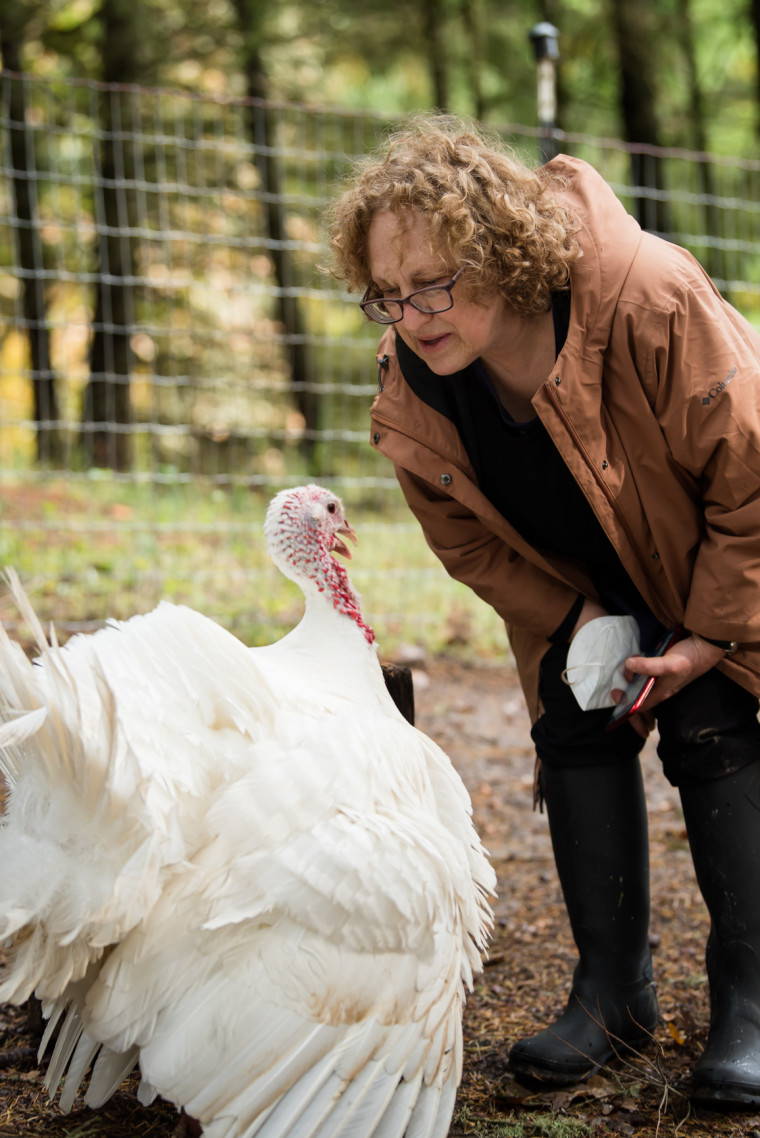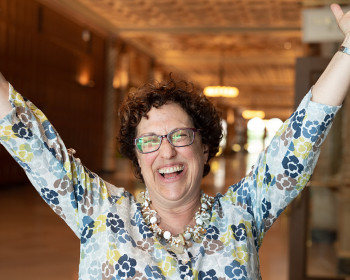A Thanksgiving Reflection: What We Can Learn From Farmed Animals
In this blog, Professor of Practice and Animal Law pioneer, Joyce Tischler, shares stories about a few of the memorable farmed animals she’s met over the years, what they’ve taught her, and why she’s hopeful for the future of farmed animal protection.
Open gallery

When my daughter, Margeve, was growing up, our family would visit a farm sanctuary where we could walk, run and play on hundreds of acres of beautiful open farmland, and hobnob with the rescued farmed animals. With each visit, I would focus on a group of animals and spend time getting to know them. Much of what I’ve learned about farmed animals has come from just watching them do their thing.
On this occasion, I decided to park myself at the entrance to the turkey barn. No sooner had I sat down when a large male or “tom” turkey walked over and started to slowly circle around me. Because I was sitting on the ground, our heads were at about the same height. If I reached out my hand, he would back away, but if I sat very still, he would look at me intently, as he slowly walked around me. By the third rotation, he was within a few inches of my face. I had no idea what he was thinking, but I was charmed by his curiosity. He left, and another male turkey took his place, doing the same circling and keeping his focus fastened to me. And, then, another. My daughter watched this and later teased me, saying, “hey mom; you have turkey boyfriends!”
These rescued turkeys were friendly, and curious, and so endearing in their efforts to figure out who this strange little woman was. I find that if you sit with farmed animals, you cannot leave without knowing that they are a “who” and not a “thing”. I have made it a priority to sit with farmed animals when I can, and each time I marvel at what they teach me.
Most recently, I had the pleasure of meeting an impressive white turkey named Belle when I volunteered at the Wildwood Farm Sanctuary. Belle is the boss of everyone. She squawks and bites, and pulls on clothing. We had a lengthy conversation and all of the above happened to me. But we quickly became friends. I like strong women, and I could tell right away that Belle was my kind of gal. She also reminded me of the individuality of these beautiful creatures and how, just like us, they have unique personalities, if we take the time to truly see them.
Yet our laws fail to properly protect animals like Belle, treating them as if they were merely inanimate things. For example, there is no federal law that protects turkeys (or any other farmed animal) while they are being raised on factory farms. Many people assume that the federal Animal Welfare Act provides protection while animals are being raised for food, but it specifically excludes farmed animals from its protections. Farmed animals do not fare much better under state laws. We must do better!
As a Professor of Practice at the Center for Animal Law Studies, I am committed to protecting powerless farmed animals by educating the next generation of animal law attorneys to be their advocates. The billions of farmed animals that our legal system fails to properly recognize feel joy, pain, love, and they experience deep family bonds like we do. This Thanksgiving, as I reflect on what I’m grateful for, our dedicated students and alumni who are fighting for protection and compassion for farmed animals are at the top of my list. They are talented, smart and committed to ensuring a better future for farmed animals. I have every confidence that this next generation will create meaningful and lasting change for the billions of farmed animals who so desperately need it.
If you’re interested in helping farmed animals too, please consider the following ways to make a difference:
- Learn about how farmed animals are treated under the law.
- Consumers consistently say that they want farmed animals to be treated humanely, but that is not reflected in the law or the standard treatment that farmed animals receive by the industries that control them. Support legislation and other advancements to improve farmed animal protection. As a consumer, demand that the law, and the meat, dairy and egg industries catch up with how society feels that farmed animals should be treated: with kindness and compassion.
- Donate to CALS to support our work educating the next generation of animal law attorneys to be the voice of farmed animals.
- Consider how you may contribute to the suffering of farmed animals and protection of the environment in your own choices, through diet, clothing, lifestyle, and more. Ask yourself how you can have a lighter carbon footprint and reduce the suffering of farmed animals.


The Center for Animal Law Studies (CALS) was founded in 2008 with a mission to educate the next generation of animal law attorneys and advance animal protection through the law. With vision and bold risk-taking, CALS has since developed into a world-renowned animal law epicenter, with the most comprehensive animal law curriculum offered anywhere. In addition, CALS is the only program that offers an advanced legal degree in animal law and three specialty Animal Law Clinics, including our Animal Law Litigation Clinic–the world’s only legal clinic focused on advancing protections for farmed animals. CALS is a nonprofit organization and is only able to provide these educational opportunities through donations and grants.
More Center for Animal Law Studies Stories
Center for Animal Law Studies is located in Wood Hall on the Law Campus.
MSC: 51
email cals@lclark.edu
voice 503-768-6960
Center for Animal Law Studies
Lewis & Clark Law School
10101 S. Terwilliger Boulevard MSC 51
Portland OR 97219

